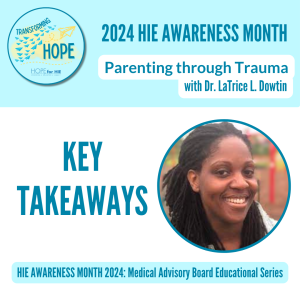
No matter its length, whether it’s a NICU stay, PICU stay, or hospitalization, the experience is often accompanied by trauma, and our HIE families want an anchor amidst the storm.
In our recent conversation with Dr. Latrice L. Dowtin, Co-Chair of the National Network of NICU Psychologists, founder and clinician at PlayfulLeigh Psyched, and Hope for HIE Medical Advisory Board Member, we confronted a pressing question: how do we authentically support families facing PTSD, emotional burnout, and trauma without merely pouring notions of resilience and self-care upon them? Because, let’s face it, you’ve likely displayed enough resilience for a lifetime, and you’re due for other effective ways to cope and parent through the trauma.
Missed the live stream Q&A? No worries. We took notes, and like any good partner, we are willing to share! Read our key takeaways below.

You’d think “trauma” and “play” belong on opposite sides of the spectrum, especially for parents navigating through the thickets of hardship, but as Dr. Dowtin explains, play is actually a vital healing tool, as it allows parents to nurture joy and wellness amid turmoil.
That’s why play is one of the pillars of her organization, PlayfulLeigh Psyched, which specializes in providing trauma therapy to historically marginalized and minoritized populations: it has a forgiving nature. While trauma may loom large, it does not define the entirety of your existence and experiences. Embracing play, whether through observation, nature walks, moments of reflection, or miniature dance parties, can allow you to acknowledge your hardship while still finding delight in moments of laughter and small pleasures.
Play is also universally a child’s first language—it’s their primary mode of expression and engagement with the world, and it doesn’t discriminate by ability. It’s important for adults to model play for their children, as it teaches that moments of joy are not confined to specific moments and can still exist in times of hardship.

According to Dr. Dowtin, how parents naturally cope during a NICU, PICU, or hospitalization experience is not always the most effective way to cope. That’s because there are some unwritten—and untrue—rules parents feel they need to follow to come out the other side.
Debunk: Dr. Dowtin isn’t saying you can’t be sad or optimistic throughout this experience; it’s only natural to experience these emotions. Instead, she wants to encourage parents to express and process all of their emotions during the journey and to do so without the pressure to display complete sadness or toxic positivity — this idea that you have to maintain a positive mindset at all costs, which dismisses any genuine feelings of distress, sadness, or anger.
Debunk: The myth suggests that any doubts or uncertainties about tough choices are signs of inadequacy or incompetence. Nope. Recognize you’re grappling with big decisions, and give yourself some grace. You’re using all the information you have, and ultimately, you are the only one qualified to make the right choice for yourself and your family.
Debunk: The “what ifs” and the following guilt will come. That’s unavoidable. But the truth is, parents cannot control every aspect of their child’s health or circumstances, especially in complex medical situations like those encountered in the NICU. So, in those moments when guilt floods your emotions, Dr. Dowtin says to create a mantra to repeat to yourself when you most need it: I didn’t do anything to deserve or cause this.
Debunk: Selflessness, while pure-intentioned, can cause you more harm because it can take away from your own mental and emotional stability. Especially in circumstances like the NICU, parents and caregivers need to have enough in their buckets to make decisions and provide care to their babies. If this seems impossible, start small. Perhaps it’s a coffee break, a trip home to shower, or a quick walk around the hospital grounds — give yourself ways to refill your bucket when it gets low.
Debunk: That’s just not how trauma works. It doesn’t matter if what you’re witnessing another family go through in the not-so-private NICU setting is not directly happening to you. You can still have trauma symptoms because your fear center is naturally telling you, “That can happen to my baby. We’re next.” While you ultimately can’t control every aspect of your surroundings, there are some solutions to help take your focus away from others’ lived experiences and more on your own. Find comforting distractions at the bedside: use earphones to listen to music or find a book to read to your baby.
Debunk: Maintaining a facade of knowledge and confidence in the NICU and avoiding asking questions doesn’t alleviate trauma; it enhances it. It’s proven that parents’ stress levels decrease the more knowledgeable they feel. The only way to do that is by asking questions. Develop a relationship with the bedside nurses, who can answer your question directly or help find another staff member to provide the information you need. They’re there to support you and your baby, so don’t hesitate to reach out and ask for assistance whenever you have doubts or concerns.

This is especially true upon a NICU, PICU, or hospitalization discharge. Dr. Dowtin explains how many parents and caregivers expect their anxiety levels to lower upon discharge, mainly as that milestone served as a beacon of light at the end of the tunnel, but this is not often the case. In fact, most parents report having higher levels of worry upon NICU discharge because, while that usually signifies a transition to a less intense level of care, it also marks the beginning of new challenges and responsibilities, most of whom feel unqualified to take on (at least at first.)
How can this be combated? First, you must know that a hospital discharge goes beyond just receiving a packet of information. We’d like to repeat that. A hospital discharge goes beyond just receiving a packet of information. If it’s not initiated, request a discharge meeting with the healthcare team.
Unfortunately, we know some families have experienced not being heard or marginalized, but you always have the right to ask questions and speak up for what you need to feel more comfortable. Also, while you may not think you need support resources, ask the social worker for them anyway. There might come a time at home when you wish you had them, and just the simple knowledge of what resources are available can provide you with peace of mind, reassurance, and, most importantly, support and connection.

We’re afraid the “post” in “post-traumatic stress disorder” doesn’t have a clear statute of limitations. Trauma symptoms may not manifest immediately following a challenging medical event; sometimes, these symptoms emerge months or even years later, catching parents and caregivers off guard.
Then, there’s the diagnosis-traumatization loop. Especially with HIE, where there is a range of impacts, outcomes, and onsets, each new diagnosis or medical complication can feel like reopening a wound, contributing to a cycle of re-traumatization. The relentless nature of this cycle can be exhausting and doesn’t bode well in terms of healing.
Dr. Dowtin also wants to debunk societal stigmas of mental health: the maternity mortality rate and thoughts of suicide are considerably high in parents of medically fragile children, as they often experience heightened levels of stress, anxiety, and depression due to the ongoing medical needs and uncertainties surrounding their child’s health.
This is often confounded by guilt and fear — how dare I think these thoughts when my child needs me, and what happens if I voice concerns about my mental health? Will they deem me unfit to care for my child?

…and there are some steps we can take to do just that:

Trauma impacts individuals uniquely based on their experiences and circumstances, but no matter its manifestation, this is an important distinction to note: trauma exists in the past but affects us now; anxiety exists in the future but affects us now. Either way, they both have the power to shape our perceptions, responses, and overall well-being.

Honestly, self-care may feel like another task on an already overwhelming to-do list, so let’s consider a different yet powerful alternative: building a community of care. Surrounding yourself with people who provide a safe space for honesty, vulnerability, and support can be immensely beneficial.
We also know this is a luxury and privilege for some and isn’t readily available to everyone, especially since so many variables go into building a support network. Building that community support network can feel overwhelming when considering elements like where you live and family dynamics.
This is when you can turn to support organizations, many of which are listed below, to build that community.

To watch the full live stream, visit our YouTube channel below, or click on our Key Takeaways for an at-a-glance view of this session!
Connect with families, read inspiring stories, and get helpful resources delivered right to your inbox.